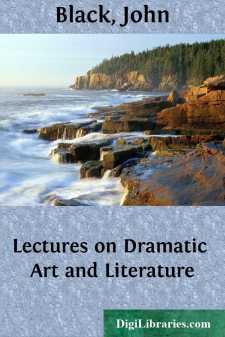Categories
- Antiques & Collectibles 13
- Architecture 36
- Art 48
- Bibles 22
- Biography & Autobiography 813
- Body, Mind & Spirit 142
- Business & Economics 28
- Children's Books 17
- Children's Fiction 14
- Computers 4
- Cooking 94
- Crafts & Hobbies 4
- Drama 346
- Education 46
- Family & Relationships 57
- Fiction 11829
- Games 19
- Gardening 17
- Health & Fitness 34
- History 1377
- House & Home 1
- Humor 147
- Juvenile Fiction 1873
- Juvenile Nonfiction 202
- Language Arts & Disciplines 88
- Law 16
- Literary Collections 686
- Literary Criticism 179
- Mathematics 13
- Medical 41
- Music 40
- Nature 179
- Non-Classifiable 1768
- Performing Arts 7
- Periodicals 1453
- Philosophy 64
- Photography 2
- Poetry 896
- Political Science 203
- Psychology 42
- Reference 154
- Religion 513
- Science 126
- Self-Help 84
- Social Science 81
- Sports & Recreation 34
- Study Aids 3
- Technology & Engineering 59
- Transportation 23
- Travel 463
- True Crime 29
Lectures on Dramatic Art and Literature
by: John Black
Description:
Excerpt
MEMOIR OF THE LITERARY LIFE OF AUGUSTUS WILLIAM VON SCHLEGEL
AUGUSTUS WILLIAM VON SCHLEGEL, the author of the following Lectures, was, with his no-less distinguished brother, Frederick, the son of John Adolph Schlegel, a native of Saxony, and descended from a noble family. Holding a high appointment in the Lutheran church, Adolph Schlegel distinguished himself as a religious poet, and was the friend and associate of Rabener, Gellert, and Klopstock. Celebrated for his eloquence in the pulpit, and strictly diligent in the performance of his religious duties, he died in 1792, leaving an example to his children which no doubt had a happy influence on them.
Of these, the seventh, Augustus William, was born in Hanover, September 5th, 1767. In his early childhood, he evinced a genuine susceptibility for all that was good and noble; and this early promise of a generous and virtuous disposition was carefully nurtured by the religious instruction of his mother, an amiable and highly-gifted woman. Of this parent's pious and judicious teaching, Augustus William had to the end of his days a grateful remembrance, and he cherished for her throughout life a sincere and affectionate esteem, whose ardour neither time nor distance could diminish. The filial affection of her favourite son soothed the declining years of his mother, and lightened the anxieties with which the critical and troubled state of the times alarmed her old age. His further education was carried on by a private tutor, who prepared him for the grammar-school at Hanover, where he was distinguished both for his unremitting application, to which he often sacrificed the hours of leisure and recreation, and for the early display of a natural gift for language, which enabled him immediately on the close of his academic career to accept a tutorial appointment, which demanded of its holder a knowledge not only of the classics but also of English and French. He also displayed at a very early age a talent for poetry, and some of his juvenile extempore effusions were remarkable for their easy versification and rhythmical flow. In his eighteenth year he was called upon to deliver in the Lyceum of his native city, the anniversary oration in honour of a royal birthday. His address on this occasion excited an extraordinary sensation both by the graceful elegance of the style and the interest of the matter, written in hexameters. It embraced a short history of poetry in Germany, and was relieved and animated with many judicious and striking illustrations from the earliest Teutonic poets.
He now proceeded to the University of Göttingen as a student of theology, which science, however, he shortly abandoned for the more congenial one of philology. The propriety of this charge he amply attested by his Essay on the Geography of Homer, which displayed both an intelligent and comprehensive study of this difficult branch of classical archaeology.
At Göttingen he lived in the closest intimacy with Heyne, for whose Virgil, in 1788 he completed an index; he also became acquainted with the celebrated Michaelis....


